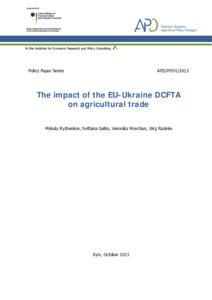
The impact of the EU-Ukraine DCFTA on agricultural trade
Foreign trade in agricultural and food products constitutes an important part of Ukraine’s commodity trade. Moreover, its importance is expected to grow in the future given the high and still untapped sector potential and increasing world demand for agriculture and food products. The European Union, with its high consumption of agriculture products, is already now one of the largest trade partners of Ukraine for agricultural products. However further development of agro-food trade is hampered by a combination of high tariffs and non-tariff measures. For example, applied import duties on agriculture, food and agriculture-related products are higher in the EU than in Ukraine. At the same time, the NTMs are estimated to be higher in Ukraine. The deep and comprehensive free trade agreement (DCFTA), expected to be signed in November 2013 in Vilnius as an integral part of the Association Agreement between the EU and Ukraine, has the potential to significantly reduce trade barriers thereby opening new opportunities for trade development and increasing the role of Ukraine as a global trade player on the international agricultural markets. The DCFTA will see many tariffs disappear, whereas the character of tariff reductions will differ: while the EU will eliminate almost all tariffs immediately, it also applies a wider scope of tariff-rate quotas. Ukraine will reduce tariffs more gradually and even preserve non-zero import tariffs for selected products, but will apply tariff rate quotas to just a few product groups. For NTM, however, the process will focus almost entirely on Ukraine, which will have to approximate in a wide range of areas to EU legislation. This requires significant resources on Ukraine side, although technical and financial support of the EU is expected. Once legislative harmonization is successfully done this should lower NTM trade barriers to an unprecedented level. It is estimated that due to the EU import tariffs reduction and despite binding tariff rate quotas, Ukraine will be able to export about 20% more of agro-food products with the main contribution by exports of tobacco, cereals, meat and miscellaneous edible products. Oil seeds exports will benefit from export duties elimination, providing gains comparable with the impact of the EU import duties reduction. Decline in Ukraine’s import duties will result in approximately 7% additional imports, mostly due to increased shipments of beverages, vegetable oils and fats, meat, mineral or chemical fertilizers, animal oils and fats, and sugar. Tariff liberalization could also generate new trade flows of products not previously traded by the EU and Ukraine. Ukraine, as a major agriculture producer with a number of natural and economic comparative advantages should be able to benefit from signing the EU-Ukraine DCFTA. However, this requires that the government sets immediately an adequate policy framework in place. Specifically, the government should put a strong focus of state support to producers on how to meet the relevant EU standards / regulations. Intense information and know-how exchange as well as training and education will be of key importance. To mitigate pressure on domestic producers, temporary state support in form of access to information, advisory services, trainings etc. might be considered by the Ukrainian government to avoid steep further rise of unemployment in rural areas. 4 In this context the government should make all efforts and put in place corresponding resources to get immediate access to the specific technical assistance programs and other support tools from the EU, particular EU-countries and other international organizations, supporting EU approximation of Ukraine.